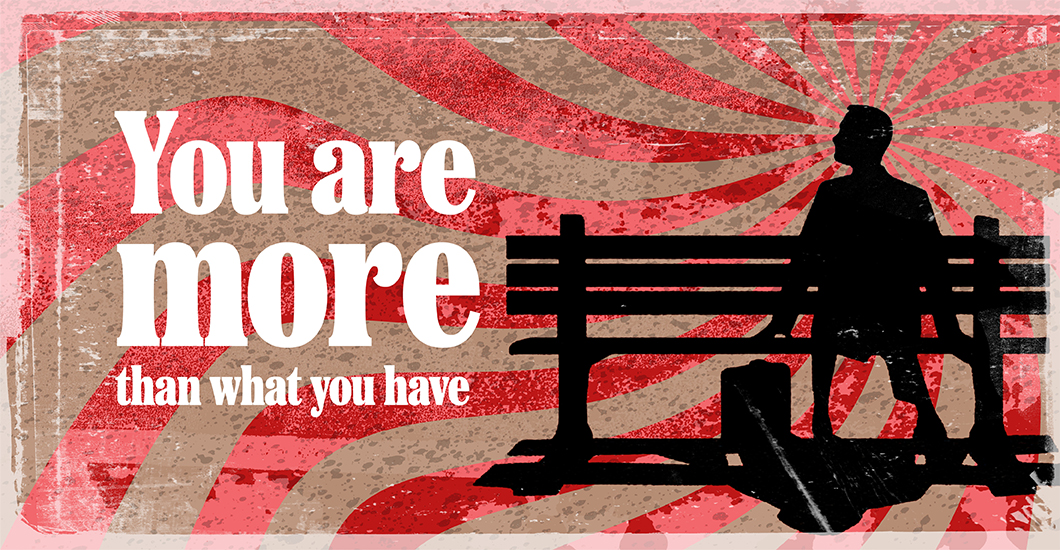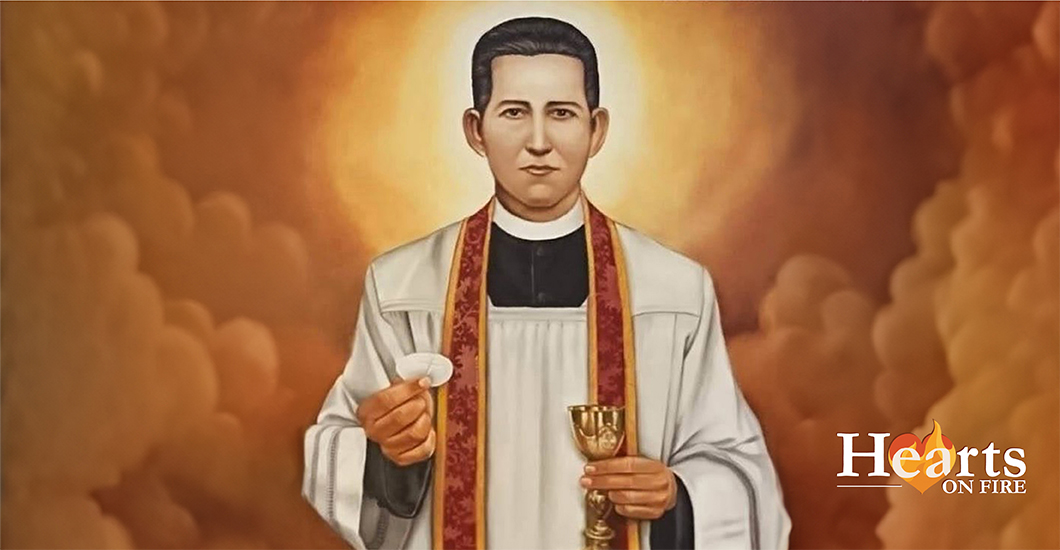Trending Articles
You are more than what you have
Super-wealthy, know-it-all, well-respected, powerful influencer…the list is endless, but all these don’t matter when it comes to the question of who you are.
During the early ’60s, the folk-rock group The Byrds had a mega-hit called Turn! Turn! Turn! which was adapted from the third chapter of Ecclesiastes. I found the song riveting. It encouraged me to read the entire Book, which I found to be very strange. It was strange because, unlike the lyrics to the song, I found the rest, especially the first chapter, to be a ‘Debbie Downer,’ an unrelenting treatment of the human condition.
The author, Qoheleth, is a self-described old man who has seen it all, done it all, and experienced it all. He has enjoyed everything life has to offer—he is super-wealthy, has accumulated knowledge, is well respected by his peers, has the power to navigate through life, and basically has enjoyed every creature comfort that can come his way. But, given all of that, he has come to the conclusion that it doesn’t matter.
Why not? I think he realized deep down that who you are is far more important than what you have.The reason is relatively straightforward—the goods of the world will always pass and fade away because they are ephemeral, transitory, and finite.
Before You are Whisked Away
Who we are is a matter of our moral and spiritual character, a matter of the soul. In the opening chapters of Genesis, it is revealed to us that we are made in the image and likeness of God, which constitutes us to participate in God’s very Being and Eternal Life. Put simply, we are who we are in relationship to God, not in what we have. We are, to the very core, spiritual and religious beings.
In the Gospel parable of the rich fool, Jesus makes a similar point but goes much further. Jesus effectively mocks the man who gives his allegiance to his wealth and security, in the false assumption that they will bring him joy. The man is not only wealthy, but his wealth is going to expand dramatically because he has had a good harvest. So, what does he do? He resolves to tear down his old barns and build bigger ones to store his added riches. The man has built his life on several considerations: (1) the goods of the world are valuable; (2) the many years, a lifestyle that it takes to realize his ambitions; (3) his wealth will promote a sense of tranquillity and unrestrained enjoyment. Given all of these considerations, nothing is lacking.
Au contraire, foolish rich young man! The Word that God addresses to him nullifies his plans: “You fool, this night your life will be demanded of you and the things that you have prepared, to whom will they belong?” (Luke 12:20) What Jesus is telling him is that God is not demanding his possessions, but his very life—who he is! And that demand is being made not in the distant future but right here, right now.
This night, your soul, your heart, your life will be required of you. “So,” Jesus says, “it is with those who store up treasures for themselves but are not rich toward God.” (Luke 12:21) Instead of the ‘enjoyment of life,’ i.e., the accumulation of the goods of the world, Jesus presents him with surrendering his life. “Seek His Kingdom, and these things will be given to you as well.” (Luke 12:31)
Ultimately Real
Dear reader, this is the linchpin—a primordial either-or choice: Is my gaze on God or is it on the goods of the world? If the former, then we will live out our true dignity of being human. We will love God with our whole heart and soul and our neighbor as ourselves because we are grounded in what is ultimately real. We will be in the right relationship with God, our neighbor, and all of creation.
Being attached to the goods of the world cannot possibly satisfy the desire of the heart because they cannot love us, which is the soul’s basic desire. Instead, this obsession and addiction causes more hunger and gives rise to a heightened sense of anxiety. Put bluntly, if we reject the sacred and transcendent in our lives, we will inevitably experience a dread of our very existence, a sense of emptiness and alienation from our fellow human beings, deep loneliness, and guilt.
It doesn’t have to end this way. Jesus invites us to take a realistic look at how wealth can enslave our hearts and distract us from where our true treasure lies, which is the Kingdom of God fulfilled in Heaven. Along this line, Saint Paul reminds us in his letter to the Colossians to “Set your minds on things that are above, not on things that are on earth.” (3:1-2)
It is, therefore, important for us to examine what we really love. Love that is lived according to the Gospel is the source of true happiness, whereas the exaggerated and unrequited search for material goods and wealth is often a source of restlessness, anxiety, abuse of others, manipulation, and domination.
The readings from Ecclesiastes, Luke’s Gospel, and Paul’s letter all point to the question: ‘Who am I?’ which matters infinitely more than what you have. What matters is that you are God’s beloved child, created to rest ultimately in God’s love.

Deacon Jim McFadden ministers at Saint John the Baptist Catholic Church in Folsom, California. He serves in adult faith formation, St. Vincent DePaul Society/Loaves and Fishes, and spiritual direction.
Related Articles
The greatest evangelist is, of course, Jesus himself, and there is no better presentation of Jesus’ evangelical technique than Luke’s masterful narrative concerning the disciples on the road to Emmaus. The story opens with two people going the wrong way. In Luke’s Gospel, Jerusalem is the spiritual center of gravity— it is the locale of the Last Supper, the Cross, the Resurrection and the sending of the Spirit. It is the charged place where the drama of Salvation unfolds. So in walking away from the capital city, these two erstwhile disciples of Jesus are going against the grain. Jesus joins them on their journey—though we are told that they are prevented from recognizing Him—and He asks them what they are talking about. Throughout His ministry, Jesus associated with sinners. He stood shoulder to shoulder in the muddy waters of the Jordan with those seeking forgiveness through the baptism of John; over and again, He ate and drank with disreputable types, much to the chagrin of the self-righteous; and at the end of His life, He was crucified in between two thieves. Jesus hated sin, but He liked sinners and was consistently willing to move into their world and to engage them on their terms. And this is a first great evangelical lesson. The successful evangelist does not stand aloof from the experience of sinners, passing easy judgment on them, praying for them from a distance; on the contrary, she loves them so much that she joins them and deigns to walk in their shoes and to feel the texture of their experience. Prompted by Jesus’ curious questions, one of the travelers, Cleopas by name, recounts all of the 'things' concerning Jesus of Nazareth: “He was a prophet mighty in word and deed before God and all the people; our leaders, though, put Him to death; we thought He would be the redeemer of Israel; this very morning, there were reports that He had risen from the dead.” Cleopas has all of the 'facts' straight; there is not one thing he says about Jesus that is wrong. But his sadness and his flight from Jerusalem testify that he doesn’t see the picture. I love the clever and funny cartoons in the New Yorker magazine, but occasionally, there is a cartoon I just don’t understand. I’ve taken in all of the details, I’ve seen the main characters and the objects around them, I’ve understood the caption. Yet, I don’t see why it’s funny. And then there comes a moment of illumination: though I haven’t seen any further detail, though no new piece of the puzzle has emerged, I discern the pattern that connects them together in a meaningful way. In a word, I 'get' the cartoon. Having heard Cleopas’ account, Jesus say: “Oh, how foolish you are! How slow of heart to believe all that the prophets said.” And then He opens the Scriptures to them, disclosing the great Biblical patterns that make sense of the 'things' that they have witnessed. Without revealing to them any new detail about Himself, Jesus shows them the form, the overarching design, the meaning—and through this process they begin to 'get' Him: their hearts are burning within them. This is the second great evangelical lesson. The successful evangelist uses the Scriptures in order to disclose the divine patterns and ultimately the Pattern who is made flesh in Jesus. Without these clarifying forms, human life is a hodge-podge, a blur of events, a string of meaningless happenings. The effective evangelist is a man of the Bible, for the Scripture is the means by which we 'get' Jesus Christ and, through Him, our lives. The two disciples press Him to stay with them as they draw near the town of Emmaus. Jesus sits down with them, takes bread, says the blessing, breaks it and gives it to them, and in that moment they recognize Him. Though they were, through the mediation of Scripture, beginning to see, they still did not fully grasp who He was. But in the Eucharistic moment, in the breaking of the bread, their eyes are opened. The ultimate means by which we understand Jesus Christ is not the Scripture but the Eucharist, for the Eucharist is Christ Himself, personally and actively present. The embodiment of the paschal mystery, the Eucharist, is Jesus’ love for the world unto death, His journey into godforsakenness in order to save the most desperate of sinners, His heart broken open in compassion. And this is why it is through the lens of the Eucharist that Jesus comes most fully and vividly into focus. And thus we see the third great evangelical lesson. Successful evangelists are persons of the Eucharist. They are immersed in the rhythms of the Mass; they practice Eucharistic adoration; they draw the evangelized to a participation in the body and blood of Jesus. They know that bringing sinners to Jesus Christ is never primarily a matter of personal witness, or inspiring sermonizing, or even exposure to the patterns of the Scripture. It is primarily a matter of seeing the broken heart of God through the broken bread of the Eucharist. So prospective evangelists, do what Jesus did. Walk with sinners, open the Book, break the Bread.
By: Bishop Robert Barron
MoreI remember a childhood story in which God, about to destroy Earth because of humanity's wrongdoing, looked down, saw the lilies of the field praying for mankind, and extended the end of time. It was my wife's desire to attend daily Mass that led us to the nearby Carmelite Monastery. I was immediately struck by the pervasive stillness and a sense of tranquility. Through the grilled gates, these nuns looked like God's lilies on earth. As I was introduced to their daily life, I was surprised to learn that the sisters make vestments, altar breads, and greeting cards. They even stitch their own habits, grow their own fruits and vegetables, and look after the other elderly sisters. Most of the day is spent in silence, which helps them to open up to the Lord and pray. The sisters even meet up twice a day to talk and share. The power of prayer and its impact dawned upon me. The Church has a rich tradition of prayer, through which we deeply connect with God, whether it's through attending Mass, reciting the Rosary, or simply taking a few moments to reflect on God's presence in our lives. The experience of visiting the Carmelite Monastery was truly humbling. It helped me reflect on the power of prayer and the importance of dedicating one's life to serving others, and left me with a sense of peace and renewed faith.
By: Winner Varghese
MoreThe Mexican Revolution which began in the early 1920s, led to the persecution of the Catholic community in that country. Pedro de Jesus Maldonado-Lucero was a seminarian at that time. Once he became a priest, despite the risk, he stood with his people. He tended to his flock during a terrible epidemic, founded new apostolic groups, reestablished associations, and ignited Eucharistic piety among his parishioners. Upon discovering his pastoral activities, the government deported him, but he managed to return and continue serving his flock, in hiding. One day, after hearing the confessions of the faithful, a gang of armed men busted his hiding place. Father Maldonado managed to grab a reliquary with Consecrated Hosts as they forced him out. The men forced him to walk barefoot throughout the town, as a crowd of the faithful followed him. The city mayor grabbed Father Maldonado's hair and dragged him toward the city hall. He was knocked to the ground, resulting in a skull fracture that popped out his left eye. He had managed to keep his grip on the pyx until this time, but now it fell out of his hands. One of the thugs took some Holy Hosts, and as he forcefully stuffed the hosts inside the priest’s mouth, he shouted: “Eat this and see if He can save you now.” Little did the soldier know that just the night before, during the Holy Hour, Father Maldonado had prayed that he would happily give his life for an end to the persecution ‘if only he would be allowed to take Communion before his death.’ The thugs left him for dead in a pool of his own blood. Some local women found him still breathing and rushed him to a nearby hospital. Father Pedro Maldonado was born into eternal life the next day, on the 19th anniversary of his priestly ordination. Pope John Paul II canonized this Mexican priest in 2000.
By: Shalom Tidings
MoreWhen Andrea Acutis arranged a pilgrimage to Jerusalem, he thought that his son would be excited. Carlo was keen on going to daily Mass and reciting his prayers, so his reply came as a surprise: "I prefer to stay in Milan … Since Jesus remains with us always, in the Consecrated Host, what need is there to make a pilgrimage to Jerusalem to visit the places where He lived 2000 years ago? Instead, tabernacles ought to be visited with the same devotion!" Andrea was struck by this great devotion that his son cherished for the Eucharist. Carlo was born in 1991, the year the World Wide Web was invented. The little genius walked when he was just four months old, and started reading and writing at the age of three. The world would’ve looked at his intellect and dreamt of a bright future but the Divine had different plans. Combining his love for the Eucharist and technology, he left the world a great legacy of a record of Eucharistic miracles from across the world. He began the collection in 2002 when he was just 11 years old and completed it a year before he succumbed to leukemia. This young computer geek, at such a young age, even built a website (carloacutis.com), a lasting record, with all the collected information. The Eucharistic exhibition he pioneered was held in five continents. Ever since, many miracles have been reported. On his website, he has written the lasting mission of his life on Earth: "The more Eucharist we receive, the more we will become like Jesus, so that on this Earth, we will have a foretaste of Heaven." This Italian teenage designer and computer whiz is soon to become Saint Carlo Acutis. Widely known as the first millennial patron of the internet, Blessed Carlo continues to draw millions of youngsters to the love of Jesus in the Eucharist.
By: Shalom Tidings
MoreWhen she lost her mobility, eyesight, listening, voice, and even the sense of touch, what prompted this young girl to describe her life as ‘sweet?’ Little Benedetta, at age seven, wrote in her diary: “The universe is enchanting! It is great to be alive.” This intelligent and happy lass, unfortunately, contracted polio in her childhood, which left her body crippled, but nothing could cripple her spirit! Hard Times on Roll Benedetta Bianchi Porro was born in Forlì, Italy, in 1936. As a teenager, she began to go deaf, but despite this, she entered medical school, where she excelled, taking oral exams by reading the lips of her professors. She had an ardent desire to become a missionary doctor, but after five years of medical training and just one year short of completing her degree, she was forced to end her studies due to increasing illness. Benedetta diagnosed herself with neurofibromatosis. There are several iterations of this cruel disease, and in Benedetta’s case, it attacked the nerve centers of her body, forming tumors on them and gradually causing total deafness, blindness, and later, paralysis. As Benedetta’s world shrank, she demonstrated extraordinary courage and holiness and was visited by many who sought her counsel and intercession. She was able to communicate when her mother would sign the Italian alphabet into her left palm, one of the few areas of her body that remained functional. Her mother would sign letters, messages, and Scripture painstakingly into Benedetta’s palm, and Benedetta would reply verbally despite her voice having been weakened to a whisper. “They’d come and go in groups of ten and fifteen,” said Maria Grazia, one of Benedetta’s closest confidantes. “With her mother as interpreter, she was able to communicate with each one. It seemed as though she could read our innermost souls with extreme clarity, even though she couldn’t hear or see us. I will always remember her with her hand extended ready to receive the Word of God and her brothers and sisters.” (Beyond Silence, Life Diary Letters of Benedetta Bianchi Porro) It’s not that Benedetta never experienced agony or even anger at this disease that was robbing her of the ability to become a medical doctor, but in accepting it, she became a doctor of another sort, a kind of surgeon to the soul. She was, indeed, a spiritual doctor. In the end, Benedetta was no less a healer than she ever desired to be. Her life had shrunken all the way down to the palm of her hand, it was no bigger than a Communion host—and yet, just like a Blessed Communion Host, it had become more powerful than she would have ever imagined. It is impossible to miss the correlation between Benedetta’s life and Jesus in the Blessed Sacrament who is hidden and small too, silent and even weak, but an ever-present friend to us. Towards the end of her life, she wrote to a young man who suffered similarly: “Because I'm deaf and blind, things have become complicated for me … Nevertheless, in my Calvary, I do not lack hope. I know that at the end of the road, Jesus is waiting for me. First in my armchair, and now in my bed where I now stay, I have found wisdom greater than that of men—I have discovered that God exists, that He is love, faithfulness, joy, certitude, to the end of the ages … My days are not easy. They are hard. But sweet because Jesus is with me, with my sufferings, and He gives me His sweetness in my loneliness and light in the darkness. He smiles at me and accepts my collaboration.” (Venerable Benedetta Biancho Porro, by Dom Antoine Marie, OSB) A Compelling Reminder Benedetta passed away on January 23, 1964. She was 27 years old. She was venerated on December 23, 1993, by Pope John Paul II and beatified on September 14, 2019, by Pope Francis. One of the great gifts that the Saints bring to the Church is that they give us a clear picture of what virtue looks like, even in incredibly difficult circumstances. We need to ‘see ourselves’ in the lives of the Saints in order to be strengthened for our own. Blessed Benedetta is truly a model of sanctity for our times. She is a compelling reminder that even a life filled with serious limitations can be a powerful catalyst for hope and conversion in the world and that the Lord knows and fulfills the deepest desire of every heart, often in surprising ways. A Prayer to Blessed Benedetta Blessed Benedetta, your world became as small as a communion wafer. You were immobilized, deaf, and blind, and yet you were a powerful witness to the love of God and the Blessed Mother. Jesus in the Blessed Sacrament is hidden and small too, silent, immobilized, and even weak—and still all-powerful, ever present to us. Please pray for me, Benedetta, that I will collaborate, as you did, with Jesus, in whatever way He wishes to use me. May I be granted the grace to allow the Almighty Father to speak through my littleness and loneliness, too, for the glory of God and the salvation of souls. Amen.
By: Liz Kelly Stanchina
MoreQ - My many Christian friends celebrate ‘Communion’ every Sunday, and they argue that the Eucharistic presence of Christ is only spiritual. I believe Christ is present in the Eucharist, but is there any way to explain it to them? A – It is indeed an incredible claim to say that at every Mass, a small piece of bread and a small chalice of wine become the very flesh and blood of God Himself. It is not a sign or a symbol, but truly the body, blood, soul, and divinity of Jesus. How can we make this claim? There are three reasons why we believe this. First, Jesus Christ said so Himself. In John’s Gospel, Chapter 6, Jesus says: “Amen, amen, I say to you, unless you eat the flesh of the Son of Man and drink His blood, you do not have life within you. Whoever eats My flesh and drinks My blood has eternal life, and I will raise him on the last day. For My flesh is true food, and My blood is true drink. Whoever eats My flesh and drinks My blood remains in Me and I in him.” Whenever Jesus says, “Amen, Amen, I say to you…”, this is a sign that what He is about to say is completely literal. Further, Jesus uses the Greek word trogon which is translated ‘to eat’—but really means ‘to chew, gnaw, or rip with one’s teeth.’ It’s a very graphic verb which can only be used literally. Also, consider the reaction of His hearers; they walked away! It says in John 6: “as a result of this [teaching], many of His disciples returned to their former way of life and no longer accompanied Him.” Does Jesus chase them down, tell them that they misunderstood Him? No, He allows them to leave—because He was serious about this teaching that the Eucharist is truly His flesh and blood! Second, we believe because the Church has always taught it from its earliest days. I once asked a priest why there was no mention of the Eucharist in the Creed which we profess every Sunday—and he replied that it was because no one debated His Real Presence, so it wasn’t necessary to officially define it! Many of the Church Fathers wrote about the Eucharist—for example, Saint Justin Martyr, writing around the year 150 AD, penned these words: “For not as common bread and common drink do we receive these; but we have been taught that the food which is blessed by the prayer of His word, and from which our blood and flesh are nourished, is the flesh and blood of that Jesus who was made flesh.” Every Church Father is in agreement—the Eucharist is truly His flesh and blood. Finally, our faith is strengthened through the many Eucharistic miracles in the history of the Church—over 150 officially documented miracles. Perhaps the most famous occurred in Lanciano, Italy in the 800s, where a priest who doubted Christ’s presence was shocked to find that the Host became visible flesh, while the wine became visible as blood. Later scientific tests discovered that the Host was heart flesh from a human male, type AB blood (very common among Jewish men). The heart flesh had been badly beaten and bruised. The blood had congealed into five clumps, symbolizing the five wounds of Christ, and miraculously the weight of one of the clumps is equal to the weight of all five taken together! Scientists cannot explain how this flesh and blood has lasted for twelve hundred years, which is an inexplicable miracle in itself. But how can we explain how this happens? We make a distinction between accidents (what something looks like, smells like, tastes like, etc) and substance (what something actually is). When I was a young child, I was at my friend’s house, and when she left the room, I saw a cookie sitting on a plate. It looked delectable, smelled like vanilla, and so I took a bite…and it was soap! I was so disappointed, but it taught me that my senses could not always decipher what something actually is. In the Eucharist, the substance of bread and wine change into the substance of Christ’s body and blood (a process known as transubstantiation), while the accidents (the taste, smell, look) remain the same. It does indeed take faith to recognize that Jesus is truly present, since it cannot be perceived by our senses, nor is it something we can deduce with our logic and reason. But if Jesus Christ is God and He cannot lie, I am willing to believe that He is not a sign or symbol, but truly present in the Most Blessed Sacrament!
By: Father Joseph Gill
MoreMy new hero is Mother Alfred Moes. I realize that she is not a household name, even among Catholics, but she should be. She came on my radar screen only after I became the Bishop of the Diocese of Winona-Rochester, where Mother Alfred did most of her work and where she lies buried. Hers is a story of remarkable courage, faith, perseverance, and sheer moxie. Trust me, once you take in the details of her adventures, you will be put in mind of a number of other gritty Catholic Mothers: Cabrini, Teresa, Drexel, and Angelica, to name a few. Mother Alfred was born Maria Catherine Moes in Luxembourg in 1828. As a young girl, she became fascinated by the possibility of doing missionary work among the native peoples of North America. Accordingly, she journeyed with her sister to the New World in 1851. First, she joined the School Sisters of Notre Dame in Milwaukee but then transferred to the Holy Cross Sisters in La Porte, Indiana, a group associated with Father Sorin, CSC, the founder of the University of Notre Dame. After clashing with her superiors—a rather typical happenstance for this very feisty and confident lady—she made her way to Joliet, Illinois, where she became superior of a new congregation of Franciscan sisters, taking the name ‘Mother Alfred.’ When Bishop Foley of Chicago tried to interfere with the finances and building projects of her community, she set out for greener pastures in Minnesota, where the great Archbishop Ireland took her in and allowed her to establish a school in Rochester. It was in that tiny town in southern Minnesota that God commenced to work powerfully through her. In 1883, a terrible tornado tore through Rochester, killing many and leaving many others homeless and destitute. A local doctor, William Worrall Mayo, undertook the task of caring for the victims of the disaster. Overwhelmed by the number of injured, he called upon Mother Alfred’s sisters to help him. Though they were teachers rather than nurses and had no formal training in medicine, they accepted the mission. In the wake of the debacle, Mother calmly informed Doctor Mayo that she had a vision that a hospital should be built in Rochester, not simply to serve that local community, but rather the whole world. Astonished by this utterly unrealistic proposal, Doctor Mayo told Mother that she would need to raise $40,000 (an astronomical figure for that time and place) in order to build such a facility. She in turn told the doctor that if she managed to raise the funds and build the hospital, she expected him and his two physician sons to staff the place. Within a short span of time, she procured the money, and the Saint Mary’s Hospital was established. As I’m sure you’ve already surmised, this was the seed from which the mighty Mayo Clinic would grow, a hospital system that indeed, as Mother Alfred envisioned long ago, serves the entire world. This intrepid nun continued her work as builder, organizer, and administrator, not only of the hospital that she had founded, but of a number of other institutions in southern Minnesota until her death in 1899 at the age of seventy-one. Just a few weeks ago, I wrote about the pressing need in our diocese for priests, and I urged everyone to become part of a mission to increase vocations to the priesthood. With Mother Alfred in mind, might I take the occasion now to call for more vocations to women’s religious life? Somehow the last three generations of women have tended to see religious life as unworthy of their consideration. The number of nuns has plummeted since the Second Vatican Council, and most Catholics, when asked about this, would probably say that being a religious sister is just not a viable prospect in our feminist age. Nonsense! Mother Alfred left her home as a very young woman, crossed the ocean to a foreign land, became a religious, followed her instincts and sense of mission, even when this brought her into conflict with powerful superiors, including a number of Bishops, inspired Doctor Mayo to establish the most impressive medical center on the planet, and presided over the development of an order of sisters who went on to build and staff numerous institutions of healing and teaching. She was a woman of extraordinary intelligence, drive, passion, courage, and inventiveness. If someone had suggested to her that she was living a life unworthy of her gifts or beneath her dignity, I imagine she would have a few choice words in response. You’re looking for a feminist hero? You can keep Gloria Steinem; I’ll take Mother Alfred any day of the week. So, if you know a young woman who would make a good religious, who is marked by smarts, energy, creativity, and get-up-and-go, share with her the story of Mother Alfred Moes. And tell her that she might aspire to that same kind of heroism.
By: Bishop Robert Barron
MoreIn the early 1900s, Pope Leo XIII requested the congregation of Missionary Sisters of the Sacred Heart to go to the United States to minister to the significant number of Italian immigrants there. The congregation’s founder, Mother Cabrini, desired to do a mission in China, but obediently heeded the Church’s call and embarked on a long journey across the sea. As she had nearly drowned as a child, she formed a great fear of water. Still, in obedience, she...across the sea. On arrival, she and her sisters found that their financial aid had not been sanctioned, and they had no place to live. These faithful daughters of the Sacred Heart persevered and began serving the people on the margins. In a few years, her mission among the immigrants flourished so fruitfully that till her passing, this aquaphobic nun made 23 transatlantic trips around the world, founding educational and healthcare facilities in France, Spain, Great Britain, and South America. Her obedience and attentiveness to the Church’s missionary call was eternally rewarded. Today, the Church venerates her as the patron saint of immigrants and hospital administrators.
By: Shalom Tidings
MoreRani Maria Vattalil was born on 29 January 1954 to Eleeswa and Paily Vattalil in a small village called Pulluvazhy, in Kerala, India. From a young age, she was brought up in the Christian faith, having love for the poor. She attended daily Mass and led family prayers. During the final year of high school, Rani felt the Lord calling her to consecrated life and entered the Franciscan Clarist Congregation in 1972. It was Rani Maria’s ardent desire to do missionary work in North India and serve the poor, even if it cost her life. She was sent to Madhya Pradesh (a central Indian state) and served several mission areas there. Sister Rani Maria was given the responsibility of coordinating the social apostolate of the local diocese. She organized various educational programs for children and young people and worked relentlessly to empower the indigenous people. She understood how the poor, illiterate farmers were exploited and taken advantage of by their landlords. So, she educated them on their rights, helped them fight for justice, and spoke for those who were unjustly imprisoned. All this infuriated the upperclass landlords, who threatened her with dire consequences if she continued supporting the cause of the poor. But Rani Maria feared nothing and did not back down from her mission to 'love her neighbor.' A devious plan was then hatched by those who hated her. On 25th February 1995, while traveling by bus, she was mercilessly stabbed 54 times by Samundhar Singh—a man hired by the landlords. She breathed her last, repeating the Holy name of Jesus. Rani Maria worked her entire life to fight for the dignity and rights of her fellow men and bore witness to the Gospel through her social activities. Sister Rani Maria’s family, following the valiant example of their daughter, forgave her murderer wholeheartedly, even inviting him to their home! This act of mercy touched him deeply; he repented of his heinous crime and became a changed man. Sister Rani Maria was beatified by Pope Francis on 4th November 2017.
By: Shalom Tidings
MoreWherever you are and whatever you do, you are irrevocably called to this great mission in life. In the mid-eighties, Australian director Peter Weir made his first American film, a successful thriller, Witness, which starred Harrison Ford. The movie is about a young boy who sees the murder of an undercover police officer by corrupt co-workers, and he’s hidden away in an Amish community for protection. As the story unfolds, he recalls what happened by putting the pieces together and then, he tells the Ford character named John Book (note the Gospel symbolism). The movie contains the marks of a witness: one sees, recalls, and tells. Circling Back Jesus showed Himself to His innermost circle so that the truth of His Resurrection would reach everyone through them. He opened the minds of His disciples to the mystery of His Death and Resurrection saying: “You are witness to these things” (Luke 24:48). Having seen Him with their own eyes, the Apostles could not remain silent about this incredible experience. What’s true for the Apostles is also true for us because we are members of the Church, the mystical Body of Christ. Jesus commissioned his disciples to “Go, therefore, and make disciples of all nations, baptizing them in the name of the Father, and of the Son, and of the Holy Spirit.” (Matthew 28:19) As missionary disciples, we testify that Jesus is alive. The only way we can enthusiastically and steadfastly embrace this Mission is to see through the eyes of faith that Jesus is Risen, that He is alive, and present within and among us. That’s what a witness does. Circling back, how does one ‘see’ the Risen Christ? Jesus instructed us: “Unless a grain of wheat falls into the earth and dies, it remains alone; but if it dies, it bears much fruit.” (John 12:23-24) Put simply, if we really want to ‘see’ Jesus, if we want to know Him deeply and personally, and if we want to understand Him, we have to look to the grain of wheat that dies in the soil: in other words, we have to look to the Cross. The Sign of the Cross marks a radical shift from self-reference (Ego-drama) to being Christ-centered (Theo-drama). In itself, the Cross can only express love, service, and unreserved self-giving. It is only through sacrificial giving of the self for the praise and glory of God and the good of others that we can see Christ and enter Trinitarian Love. Only in this way can we be grafted onto the ‘Tree of Life’ and truly ‘see’ Jesus. Jesus is Life itself. And we are hard-wired to seek Life because we are made in God’s image. That’s why we’re drawn to Jesus—to ‘see’ Jesus, meet Him, know Him, and fall in love with Him. That’s the only way we can be effective witnesses to the Risen Christ. The Hidden Seed We too must respond with the witness of a life that is given in service, a life that is patterned after the Way of Jesus, which is a life of sacrificial self-giving for the good of others, recalling that the Lord came to us as servants. Practically speaking, how can we live such a radical life? Jesus told His disciples: “You will receive power when the Holy Spirit has come upon you; and you will be My witnesses.” (Acts 1:8) The Holy Spirit, just as He did at the first Pentecost, frees our hearts chained by fear. He overcomes our resistance to do our Father’s will, and He empowers us to give witness that Jesus is Risen, He is alive and He is present now and forever! How does the Holy Spirit do this? By renewing our hearts, pardoning our sins, and infusing us with the seven gifts that enable us to follow the Way of Jesus. It is only through the Cross of the hidden seed, ready to die, that we can truly ‘see’ Jesus and therefore give witness to Him. It is only through this intertwining of death and life that we can experience the joy and fruitfulness of a love that flows from the heart of the Risen Christ. It is only through the power of the Spirit that we reach the fullness of the Life He gifted us with. So, as we celebrate Pentecost, let us resolve by the gift of Faith to be witnesses of the Risen Lord and bring the Paschal gifts of joy and peace to the people we encounter. Alleluia!
By: Deacon Jim McFadden
MoreLatest Articles
Discover how a simple snowflake can inspire you. As I drove to the Church, the snow that was supposed to turn to rain continued to fall. Individual flakes hit my windshield, quickly revealing their uniqueness before melting away. By the time I exited the Church after Mass, the snow lightly blanketed the ground. It was beautiful! Dressed in white, the barren farmland and the trees that had shed their colorful leaves no longer looked so desolate and dead. Despite the cold, the snow spread a sense of hope through the air. Of course, my children were hoping the snow would continue so that they would not have to go to school. In my part of the world, snow does bring school-age children such hope and joy. But the feeling I had that day walking out of the church was different. Standing amid the falling flakes, a verse from Psalm 51 came to mind: “Wash me, and I will be whiter than snow.” Therein lies the hope I felt – the knowledge that God loves me despite my weaknesses and sins. I need only to ask for His forgiveness and supernatural help to overcome them. He wants to cover me with His love and mercy like the snow falling gently on the earth. Thriving in Grace I took solace in the gradual covering. Our Lord is patient with us. He does not dump graces on us but allows us time for transformation. He gently leads us on the path of conversion. As I gingerly walked across the parking lot, I appreciated the baby steps we take on our journey that leads us to become the saints God is calling us to be. He delights in even our smallest progress. By afternoon, that which was a field of overturned dirt was now a woolen blanket. How amazing that those little flakes gathered together make such a difference! Such is the transformative power of grace! At every Mass when we receive Holy Communion, our souls are washed clean in the Blood of the Lamb. With each sacramental confession, we are reconciled to God and to one another. The ‘dirt’ from sin that stains our souls is washed away by the graces bestowed in these two powerful yet gentle Sacraments. Then, God sends us out into the world. Each of us, as unique as a snowflake, has our own gifts and talents. We share the Gospel in our little part of the world. Perhaps we feel like we don’t do enough, or aren’t effective enough. We feel as tiny as that snowflake. But consider how God needs each snowflake to do its little part to cover the land. Together, we can change the world! I do not have to do it all by myself. Neither do you. We just need to land where God places us and be the unique person He created us to be, spread God’s love, and make known all the good He does for us. The world will be a brighter place if we do.
By: Kelly Ann Guest
MoreHow does any parent survive the death of a child? I cannot begin to answer this question as a professional counselor but only as a mother who has lived through the worst nightmare of her life. We were blessed with two boys who were the joy of our lives. The night of the accident, my husband Cliff and I, along with our 15-year-old son Chris, spent an indescribable, terrifying night waiting, hoping, and praying that David, our 17-year-old, would somehow return home safely. The accident occurred around 10:30 pm, but the highway patrol never discovered it until 7 am the next day. When we received the horrible news, our scant flicker of hope crumbled helplessly within our hearts. I cried from the depths of my being. I was emotionally numb. Looking back after all these years, I see how God, in His compassion and love, supplied my body and spirit with an emotional safeguard that temporarily blocked out the enormous shock of this painful, unbearable reality. Thinking of that night reminds me of the touching words of the poem entitled Footprints in the Sand, in which our loving God said: “During your times of trial and suffering when you see only one set of footprints, it was then that I carried you.” God continued to carry our grief-stricken family through the painful funeral, the processing of life insurance claims, and the closing out of David's checking account. Each time I had to do these necessary things, I asked Jesus to give me strength. Tackling Grief After three weeks, I went back to work. I felt as though I was leading a double life during the months that followed. I would drag myself to work each day, drained and consumed with a deep sadness. For months, I felt as though I was an actress playing a part in a real-life drama. I tried to function normally at work, attempting to perform my required duties. At home, behind closed doors, I could then be true to my feelings and sob from the deepest part of a mother's grieving heart. Crying often became my only cleansing release. In this age of fast food, high-speed Internet, and instantly replaceable everything, society has a hard time accepting the fact that deep grief takes time to heal. If a person has a physical injury, he or she is pampered and taken care of until the wound has been completely healed. But it seems if a person has an emotional injury, he or she is expected, in a short while, to show up for work and be as efficient as ever. I finally had to accept the fact that society as a whole didn't consider emotional wounds to take time to heal. I had shared one part of that journey earlier in an article titled Impossible Made Possible*. Healing is not a single-moment-magic. I continued into the next year, processing through my pain and loss. With special dates like Thanksgiving, Christmas, David's birthday, and what would have been his high school graduation, I regressed into a deep sadness, filled with many days of crying. The professionals in the field of grieving state: “The healing process is more like a lightning bolt, full of ups and downs, progressions and regressions, dramatic leaps and depressing backslides.” When my sorrow overwhelmed me, God always sent caring neighbors, understanding friends, and loved ones. They each listened, loved me, and helped me to go on. Into the second year of processing my grief, I became aware of my deep hidden guilt. My guilt stemmed from an acute sense of regret about not being able to say all the many things hidden deep in my heart to my son David while he was alive. I knew, as a mother, I had made many mistakes while raising my son. I felt it was too late to share those precious thoughts and feelings with him. I suffered over this and asked God to forgive me. I felt God had forgiven me, but I couldn't forgive myself. I decided to write my son a letter in which I was able to express my deepest thoughts and feelings to him. After I finished the letter, I felt a sense of cleansing and release. David's physical life is over, but his soul is with Jesus, surrounded by unconditional love. This is indeed the promise that Jesus holds out to each of us. “I am the resurrection and the life. Those who believe in Me, even though they die, will live.” (John 11: 25) I have a renewed sense of hope because I know that I will see my child again at the Heavenly Banquet being prepared by our Father in Heaven. Through experiencing deep anguish and sorrow, I have emerged as a more compassionate person. As I release my son in love, I have received the healing power of God's grace. As my wounds have healed, so do I become an instrument of God's grace in reaching out to others who are grieving… *You can read the article Impossible Made Possible here: shalomtidings.org/impossible-made-possible
By: Connie Beckman
MoreThe Gospel for Easter Sunday is from Saint John’s account of Easter morning (John 20:1–9). We are told that Mary Magdalene arrives at the tomb very early in the morning while it is still dark. She has come to anoint the body of the Lord, which had been buried in haste because of the onset of the Passover. She spies the great stone rolled back and assumes that the body has been stolen. So she runs immediately to Simon Peter and the other disciples: “They have taken the Lord from the tomb, and we don’t know where they put him.” She doesn’t yet believe in the Resurrection, for she is operating still within a conventional framework. So the two disciples, Peter and John, make a mad dash toward the tomb, the younger John outpacing the older Peter. What an odd detail, by the way—so peculiar in fact, that it led the novelist Graham Greene to accept the historicity of the account. Upon coming to the open tomb, John looks in and sees ‘the burial cloths.’ Then Peter arrives and spies the same clothes, as well as the cloth that had covered his head ‘rolled up in a separate place.’ Have you ever wondered why there is such an emphasis on the burial cloths? The most obvious reason is that their presence is peculiar. If the body had been stolen, why would the thieves have bothered taking the elaborately wound cloths off, and why in the world would they have taken the time and effort to fold the head cloth up so carefully? But might they also be mentioned so prominently because they were treasured by the early Church? And might at least the principal cloth exist to this day? I’m speaking, of course, of the famous Shroud of Turin, which for centuries has been reverenced as a relic of the Crucifixion. I had a chance to see the shroud in 2010, when I was a visiting scholar in Rome and the cloth was exposed briefly for public display. It is remarkably long—long enough indeed to have covered a body front and back. On it can be seen, plainly enough, rust-colored markings that suggest the frontal and dorsal sides of a man about thirty years of age. Marks of violence can be seen on him, wounds from whipping and, quite clearly, from crucifixion—great gashes in the wrists and feet, as well as a gaping wound in the side of the torso. However, the most remarkable feature of the shroud was revealed only in 1898, when it was photographed for the first time. When the photographer, a man named Secondo Pia, developed the film, he noticed that the negative of the photo revealed an exquisitely detailed depiction of the man of the shroud, anatomically exact to a degree that no artist could have produced. So, what we see of the shroud, he concluded, is itself a kind of photographic negative. And when scientists pored over the detailed version, what they saw took their breath away. Not only was the anatomy perfectly correct, but the details of the wounds were telling, corresponding to the very sort of scourges that ancient Romans used. The ‘crown’ of thorns was more of a cap, and the wound in the side gave evidence of both blood and pericardial fluid: the blood and water that Saint John spoke of. Furthermore, traces of coins, bearing the inscription of Pontius Pilate, could be seen covering the eyelids. Also, seeds and pollen from the Middle East were found within the strands of the fabric. How was the image formed? Here, the scientists were truly stumped, for absolutely no trace of paint or pigment could be found, and the marks did not work their way down into the fabric but colored only the very surface of the shroud. The closest they could come to naming it accurately was to refer to it as a ‘scorch,’ something caused by an intense burst of radiation—which would furthermore explain the photographic negative quality of the image. What in nature would produce such a phenomenon? Nothing that we know. Does it indicate the fact of the Resurrection, when in a great burst of light and energy, the body of Jesus was brought back to life? The extraordinary and mysterious Shroud of Turin speaks to us a great Easter truth—namely, that at the heart of Christianity stands, not a myth or a legend or a symbol, but a fact, the bodily Resurrection of Jesus from the dead. It was this historical truth that sent the first Christians careering around the world to announce the ‘Gospel,’ which means ‘good news.’ They were not trading in philosophical abstractions or spiritual musings; rather, they were grabbing their interlocutors by the shoulders and telling them that something had happened. When Saint John entered the tomb and saw the burial cloths, he ‘saw and believed.’ There was something about those wrappings that convinced him. I wonder whether the same thing is true today in our hyper-skeptical age. We, too, can see the cloth in which Jesus’ body was wrapped, and we understand it far more thoroughly than Saint John ever could have. Does it cause us to ‘see and believe?’ ARTICLE originally published at wordonfire.org. Reprinted with permission.
By: Bishop Robert Barron
MoreIn a remote village, there lived a family with identical twin brothers. They were so similar that even their parents could not tell them apart. The older of the twin brothers grew up in deep faith and led a good life, while the younger brother was led astray. The younger son's plight left the parents so heartbroken. As their life drew to a close, all they wished for was the return of their younger son. The elder son promised to do everything to convert his younger brother. One day, a curfew was declared in their village. The younger son, a rebel, mocked the officials and even lashed out at them. This situation escalated and resulted in the death of a few soldiers. The whole village, in agitation, went out in search of him. Early the next morning, before sunrise, the younger brother somehow made his way to their backyard, where his older brother was waiting, and fell at his feet. After listening to all that had happened, the older brother realized that his younger brother was truly repentant from his heart. Not wasting any time, he took his younger brother for a bath and provided him with clean clothes to wear. By the time he came out, the older brother was already wearing his blood-stained clothes. By then, the mob was banging on their door. The elder brother rushed to the banging door; people beat him and got him arrested. He was sentenced to death. The grief-stricken younger brother visited his older brother in prison and burst into tears, wanting to confess the truth. The older brother put his arms through the bars and held him close, making him promise: “This truth should be known only to us, our long-departed parents, and to God alone. All that I have earned is yours. My good reputation, wealth, status...I have taken all that is yours, but you have this beautiful life to live. Take care to live it out fully well.” We do not know whether this story is true or fiction. But one thing is for sure—2000 years ago, an older brother gave up His whole life for us younger brothers and sisters at the Cross. He died in exchange for our sinful lives so that we may have new life in Him.
By: Reshma Thomas
More

















